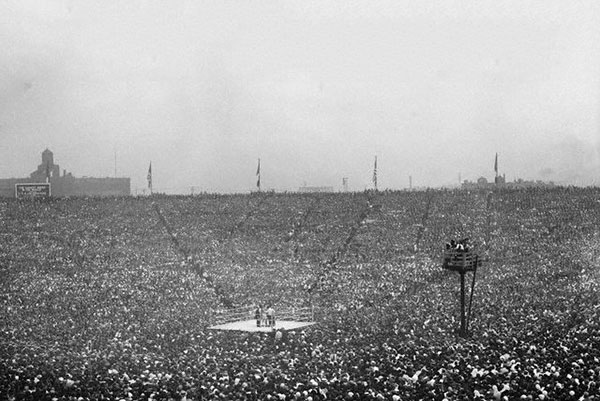Hugh Pearman’s Wall Street Journal piece, “These Knock-Down, Shrinkable Games,” looks at the transient structures that are making the London Games fiscally sensible. It reminded me that wooden insta-stadia capable of seating 50,000 to 100,000 were routinely built in a couple of months nearly a century ago for major prizefights. They were razed soon after the bout. Tex Rickard built just such a momentary edifice for Jack Dempsey’s defense of the heavyweight title against Georges Carpentier on July 2, 1921. Two excerpts follow, one from Pearman and one about the ’21 Dempsey fight stadium:
From Pearman’s WSJ piece: “Some hankered after a flashier stadium to rival Beijing’s, but a firm policy was established once the bid was won in 2005: Mindful of the legacy of neglect common among many earlier Olympic-host cities, no white-elephant buildings were allowed for London. This was to be the knock-down Games: Venues with no obvious long-term future—such as the Olympic Stadium—were designed to be dismantled entirely, while others were to be shrinkable once the huge audiences for the Games dispersed.”
From the April 26, 1921 New York Times: “Although the plot embraces thirty-four acres the particular land Rickard has contracted for includes only about six-and-one-half acres. Upon this stretch of ground the promoter will erect his giant arena with its proposed seating capacity of over 50,000. The start will be made on the arena just as soon as the ground is levelled. Rickard expects that the arena will be completed within fifty days, without rushing the workmen or necessitating overtime. It is estimated that 100 carloads of lumber will be used in its construction.”
••••••••••
Great footage of the stadium at the outset of this video:
Tags: Georges Carpentier, Hugh Pearman, Jack Dempsey, Tex Rickard

